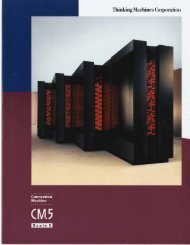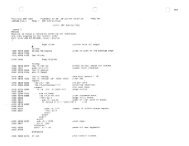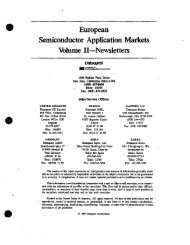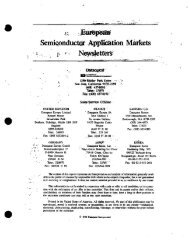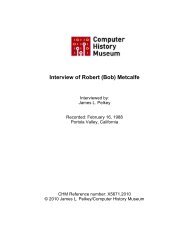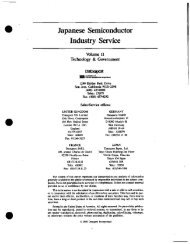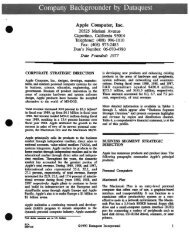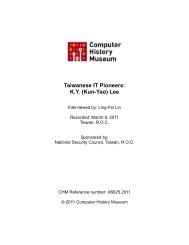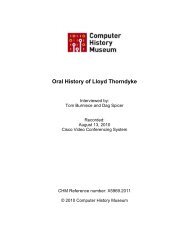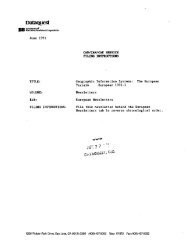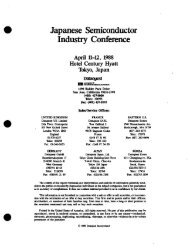Oral History of Robert Everett - Computer History Museum
Oral History of Robert Everett - Computer History Museum
Oral History of Robert Everett - Computer History Museum
Create successful ePaper yourself
Turn your PDF publications into a flip-book with our unique Google optimized e-Paper software.
Hendrie: And so the order got changed from "erase" to "keep forever.”<br />
<strong>Everett</strong>: Yes, that's right.<br />
Hendrie: There's no in-between point.<br />
<strong>Everett</strong>: No, no judgment allowed.<br />
<strong>Oral</strong> <strong>History</strong> <strong>of</strong> <strong>Robert</strong> <strong>Everett</strong><br />
Hendrie: Exactly. Oh, that is funny. Now, was SAGE capable <strong>of</strong> detecting low-flying incoming planes?<br />
That would've seemed to have been one <strong>of</strong> the hardest problems. Just because <strong>of</strong> the radar, not because<br />
<strong>of</strong> the computers or anything.<br />
<strong>Everett</strong>: The curvature <strong>of</strong> the earth.<br />
Hendrie: Yes, the curvature <strong>of</strong> the earth.<br />
<strong>Everett</strong>: The idea, in fact the original idea for SAGE, was to have small radars and multiple <br />
close enough together so that they can see small airplanes at low altitudes. And this changed to big<br />
radars with gap-fillers in-between. And the Cape Cod System had gap-fillers. And they were brought in<br />
and used, but it was still a very difficult thing to do. Once the airplanes got in, and presumably within the<br />
cover <strong>of</strong> these smaller sets, they could be detected. And then you'd have to carry it along through those<br />
until they got close enough to a big set to be seen. Two things were done. One is, there were ships<br />
anchored out…<br />
Hendrie: Picket ships.<br />
<strong>Everett</strong>: Picket ships. Because the worry was: if the airplanes had got in through the outer reaches <strong>of</strong><br />
the…<br />
Hendrie: The system.<br />
<strong>Everett</strong>: …the system. Then it was a serious matter anyway. So, you wanted to detect them far enough<br />
out so you could do something about them. So they put ships out there, and they also had Texas Towers,<br />
which were essentially drilling platforms with radars on them, which were put out. And then later there<br />
were aircraft, radar aircraft, and an early version <strong>of</strong> the AWACS [Airborne Warning and Control System]<br />
plane. And those, we built equipment for putting in them and transmitting the data back to the ground. And<br />
those can fly up and down to give it a proper alerting, because they were expensive to keep all the time.<br />
So there were these various attempts. What would have happened if the Russians had really attacked us?<br />
I don't know. Certainly some <strong>of</strong> them would have gotten in.<br />
CHM Ref: X3877.2007 © 2007 <strong>Computer</strong> <strong>History</strong> <strong>Museum</strong> Page 45 <strong>of</strong> 56



